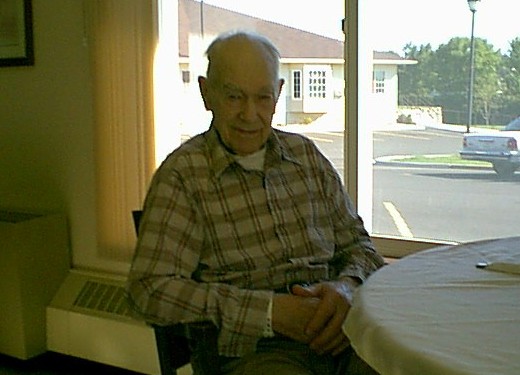Eulogy for John Diekman
I gave this eulogy at my dad’s funeral in Clear Lake, South Dakota, on September 11, 2003.
In 1920 Herman Diekman moved his wife and four sons from Nebraska to a farm near Gary, South Dakota. He shipped his machinery, cattle and horses, household goods, and dogs by train. The German immigrant was buying into the American dream. But over-mortgaged land and three years of wet weather resulted in his farm being sold on the courthouse steps in 1922. My dad was six years old.
During those wet years, snakes and frogs were everywhere. The four boys liked to catch plump little toads. They’d put the toads in their mouths to feel the pointed toes walking on their tongues.
Dad often talked about growing up in Moritz in the 1920s and 30s. Once he and Walt took a wooden hog trough into a slough for a boat ride. As soon as they climbed into the trough, it started sinking. Dad said there was no point in sitting in a hog trough under water in a slough, so they got out. They sunk to their waists in mud and had to struggle to get back to shore.
One of Dad’s best memories was buying his first motorcycle–a 1919 Harley Davidson he found lying on a rock pile in a field. That $25 purchase–one month’s wages for a farmhand–started his love affair with motorcycles.
The first day of one job, he showed up at the farm with a skinned kneecap and torn overalls, because the Harley hit a patch of gravel on the way. The farmer’s wife and daughters washed his knee and bandaged it so he could start work.
His worst motorcycle accident occurred after he bought a 1930 Harley and took off the exhaust pipe to “make it bark.” He offered Ray a ride, and a few seconds later, they were lying in the calf pasture. Dad had just opened up the throttle and was gaining speed when he hit a rut. They went at a tilt through a three-strand barbed wire fence. The motorcycle somersaulted, throwing Ray clear and landing on Dad’s shoulder.
Walt, Elm, Dad and Ray all earned their money by working as farmhands for area farmers. They also helped Grandpa on the farm he rented.
Then came 1941 and draft notices. First Ray, then Dad, then Walt.
Dad served in the Army as a military policeman at Fort Eustis, Virginia, and then a utility repairman for the Signal Corps in London, England, during the era of German buzz bombing. He enjoyed his time in London, making many friends and riding his bicycle throughout the countryside.
After World War II, Dad and Elm rented a farm in the Hidewood Valley in 1946.
Then Mildred Hanson came home from the Navy, to the farm next door, and Dad married her in 1947. A hit song Mom and Dad considered theirs was “Rainbow at Midnight,” which talked about coming home “after the war was over” and building a home in the country. One line said, “There we will live so happy, and have a baby or two.”
Actually, they had five–and that farm is still our home.
Dad could build anything, repair anything, do anything. He designed and built buildings, bookcases, and miniature furniture with drawers that fit perfectly. He was a perfectionist. He designed and built a tractor and overhauled all his machinery. People came from miles around for his welding services.
Once I used a shoebox to make a sleigh for a basket social at school, and I couldn’t figure out how to make sled runners. Dad went out to his shop and came back later with a set of perfectly curved metal runners with reinforced braces to mount on the box.
I’ve often said I owe my success as a Navy officer to my upbringing. I learned independence and integrity and commitment and respect. Our parents didn’t make choices for us. They taught us how to make choices.
They also taught us how to work. Some of my fondest childhood memories–which weren’t fond at the time–are of hauling hay bales and picking rocks, because we did them as a family.
Although we’ve had time to say goodbye to Dad as his condition worsened, that doesn’t make us miss him less. The farmer who walked home from the field when the sun told him it was dinnertime. The driver who always got us to winter destinations regardless of the snow.The dad who taught us how to make things.
Keith, Kayo, Kenny, Ron and I all became contributing members of the community. We are Dad’s legacy. And we are proud.



